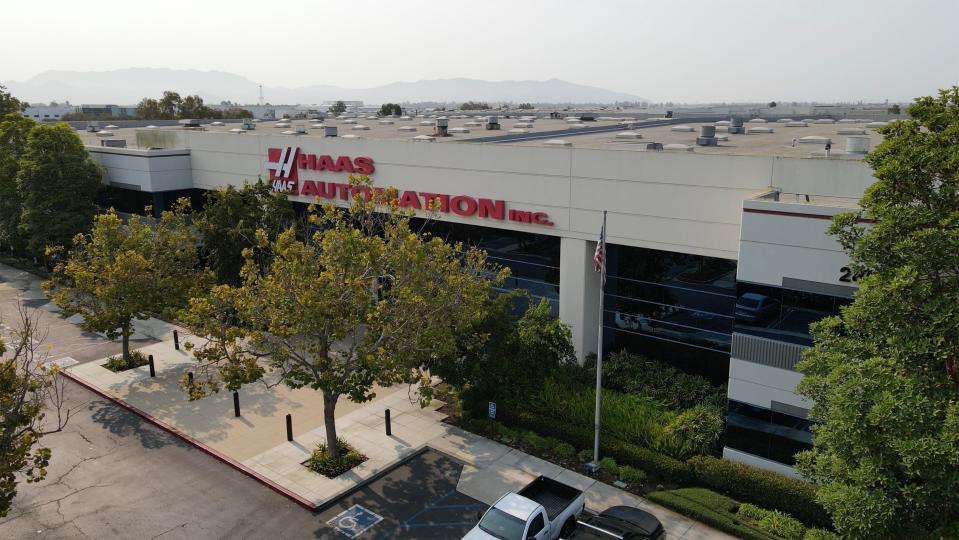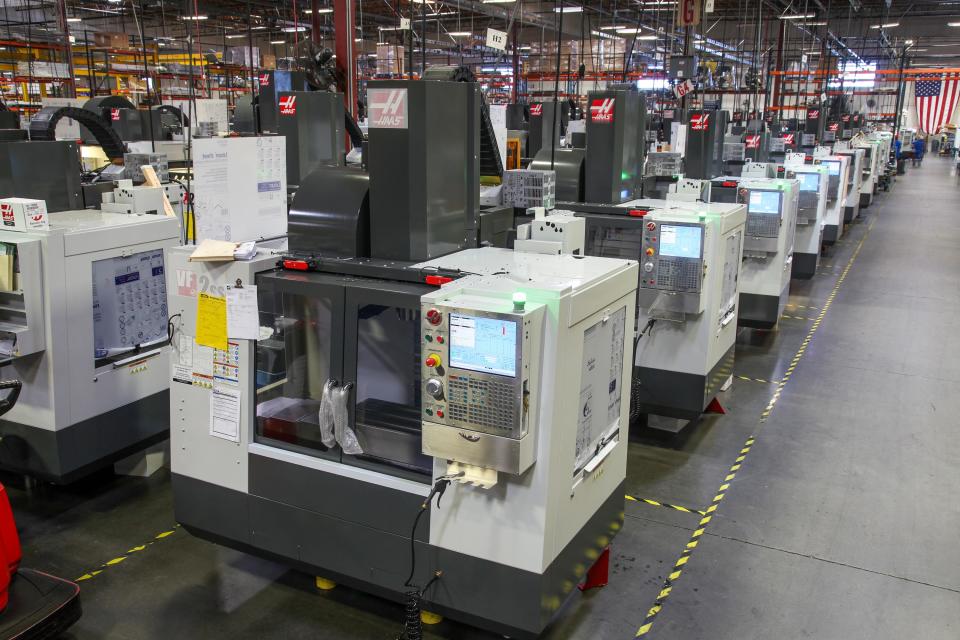Haas Automation responds to accusation its products fuel Russia's war machine
High-tech manufacturing equipment from Haas Automation in Oxnard has been used by Russian military contractors during the war in Ukraine, despite U.S. sanctions against those companies, according to a report from a Ukrainian organization that monitors companies doing business in Russia.
In an interview with The Star and in a statement posted to the company’s website, executives at Haas however denied violating sanctions and said the company has done more than was legally required to distance itself from Russia since it invaded Ukraine in February 2022.
If any Haas machine tools were sold to Russia in the past year, they said, those products left the factory prior to the invasion and were delivered by an independent distributor, against Haas’ wishes.
"We are subject to federal regulations on exports, and we have consistently complied with those regulations," said Patrick Walsh, Haas' general counsel.

'A moral obligation and a reputational risk'
The report on Haas from the Economic Security Council of Ukraine was the basis for a March 14 story by PBS NewsHour. The council also turned its evidence, including shipping and procurement records, over to the U.S. Treasury and Commerce departments, which enforce sanctions and export controls.
The ESCU says shipping records show at least 18 Haas products, worth a combined $2.8 million, were shipped to Russia between March and October of 2022, after Haas says it stopped selling to Russian buyers. The organization also says it has documents, photos and videos that show Haas machine tools in use at Russian arms factories, and Russian defense companies receiving parts and service for their Haas machines.
Olena Yurchenko, a senior analyst with the ESCU, said her organization didn't find a smoking gun that proves Haas broke the law or knowingly shipped machine tools to Russian military suppliers after March 2022. She said her group does have "serious suspicions and doubts," and would like to see the U.S. government investigate Haas for compliance with sanctions and export controls.
"It's not a witch hunt," Yurchenko said. "We're not here to destroy Haas' reputation or take down the company or throw its name in the muck. We're simply interested that the Russian military-industrial complex is deprived of its weapons and the ability to use them against our people."
The ESCU is a non-governmental organization that has investigated other companies and their ties to Russia, including some of Haas' European competitors in the machine tool industry, the tech firm Cisco Systems and the consumer products conglomerates Unilever and Procter & Gamble. The group's researchers rely on publicly available information and their Russian language expertise to publicize the companies' activities in Russia.
The goal of this work, Yurchenko said, is to convince Western businesses that "trade with Russia is kind of toxic," so they reach the same conclusion that McDonald's and Coca-Cola did last year when they left the Russian market.
"Following the law letter by letter is good, but we are talking about a moral obligation and a reputational risk here," she said.
'It was the right thing to do'
Haas executives say the company stopped selling its products to Russian buyers shortly after Russia launched its full-scale invasion of Ukraine on Feb. 24, 2022. A week later, on March 3, 2022, Haas completely severed its relationship with Abamet, its only licensed distributor for Russia and Belarus for more than 20 years, and canceled 50 pending orders, said Peter Zierhut, Haas' vice president for outside operations.
"We didn't do that because we were required to," Walsh said. "It was the right thing to do."
Zierhut said it is likely there were still Haas products in transit to Russia at that time or in Abamet's possession. Haas' export control department asked U.S. Customs and Border Protection officials about what to do with those machines, Zierhut said, and the response was, "You don't own the machines anymore so there's nothing you can do."
Walsh said Haas also went above and beyond its legal obligations when the Formula 1 racing team owned by Haas founder and owner Gene Haas cut ties with Russia in March 2022. The F1 team canceled a sponsorship agreement with Uralkali, a Russian fertilizer company, and fired driver Nikita Mazepin, whose father owned Uralkali. The lost sponsorship "cost us millions of dollars," Walsh said.
It was a bigger loss than anything Haas would stand to gain from the shipments flagged in the ESCU report, Walsh said.
"This company had $1.3 billion in sales last year," he said. "Are we going to jeopardize that for $2.8 million in sales?"
Swords and ploughshares
Haas is one of the world's leading suppliers of machine tools, which are machines used in manufacturing to shape metal or other materials. They're programmable, so machine tools are considered "dual-use technology;" in biblical terms, they can be used to make swords or ploughshares.
Because they can be used to manufacture weapons, machine tools are subject to a variety of export restrictions. Haas isn't allowed to sell to certain companies or certain entire countries, and in some cases, the U.S. government will rule that a particular machine tool is too precise to export.

After Russia invaded and annexed the Crimea region of Ukraine in 2014, the U.S. placed targeted sanctions on some Russian companies, banning U.S. companies from doing business with them. Those sanctions were greatly expanded after Russia's full-scale invasion of Ukraine in February 2022.
Throughout that time, Haas has relied on the commerce department's list of which Russian entities are allowed to purchase its products, Zierhut said.
"Our distributor has to provide us with all the information on the end user, and we match that up with the denied parties list," he said. "Globally, customers aren't always that good at describing what they do, so we rely on the U.S. government."
But the ESCU says Haas should have known its distributor, Abamet, was doing business with Russian arms companies. Yurchenko called Haas' entire business model of working with independent distributors "flawed," because it separates Haas from the ultimate users of its machines.
"It is crystal clear that this distributor has a long-established record of cooperation with the Russian military-industrial complex, for billions and billions of rubles," Yurchenko said. "You are a respectable, well-known global company which is built around this idea of independent distribution, so where is your due diligence, your screening of potential distributors?"
Haas: Defense ties are common
Zierhut said there's nothing unusual about a distributor that supplies its nation's defense industry.
"Anybody who sells machine tools in Russia probably has some pretty good ties to the defense industry, just like every distributor here in the United States wants to sell to the United States government," he said. "You're going to find that with any distributor in any country. Defense is a large part of anyone's manufacturing industry."
As for the independent distributor model, Zierhut said it's the only way for a company like Haas to supply machine tools around the world in a quick and cost-effective way. In the 1980s, a machine tool company tried to cut out the middleman and build its own distribution system. That company isn't in business anymore, Zierhut said.
In addition to photos and videos of Haas machines at Russian defense firms, the ESCU report includes photos of spare parts for sale in Russia and in use in Russian factories. Zierhut said some of those parts were clearly not supplied recently by Haas. One machine in a photo is about 20 years old, he said, and some of the spare parts are from an after-market supplier in China.
Another photo shows packaged spare parts for a Haas machine, for sale by someone with an Instragram account in Russia. Zierhut said the package "does appear to be real," and was packaged by Haas "sometime on or after 2019." The full bar code isn't visible, so Zierhut said he couldn't tell exactly when the item was produced or shipped, or who shipped it to Russia.
"It could be a part that was sitting in inventory at the distributor," he said. "The distributor does own some inventory. They maintain their own inventory of parts."
Haas has seen no evidence that any of its parts have been shipped to Russia or Belarus from distributors in other parts of the world. If there were, "we would immediately shut it down and take action" against that distributor, Zierhut said.
From 'reset button' to war
At some level, the dispute between Haas and the ESCU is about whether the company should have made an ethical decision to stop selling to Russia, long before it legally had to stop doing so.
The Russian defense industry is highly reliant on imported machine tools, Yurchenko said. In her view, Haas could have helped slow down the Russian war machine years before it rolled into Ukraine, even when sales to Russian firms were allowed by the U.S. government.
"Wasn't it obvious at least since 2008, when Russia invaded Georgia, that this is not going to stop?" she said. "Back in those days, there were tanks and jets produced which are now destroying Ukrainian cities. If that hadn't happened, perhaps now we wouldn't have to ask the United States and European Union to help us defend ourselves."
Zierhut said that standard would place companies like Haas in an impossible position. In 2009, the Obama administration made a show of pushing "the reset button" to improve its relationship with Russia, even though Russia had invaded Georgia the year before. Were machine tool manufacturers supposed to develop their own foreign policy that might be in conflict with the nation's?
"We take our lead from the United States government," Zierhut said. "Corporations should do the right thing, and we think we're doing the right thing, but the government tells us who we can sell to and who we can't sell to. It's a little unfair to beat us up for not making the right decisions, when our job is to be making machine tools and shipping them around the world for people to build things."
Tony Biasotti is an investigative and watchdog reporter for the Ventura County Star. Reach him at tbiasotti@vcstar.com. This story was made possible by a grant from the Ventura County Community Foundation's Fund to Support Local Journalism.
This article originally appeared on Ventura County Star: Haas Automation responds to allegation it violated sanctions on Russia
